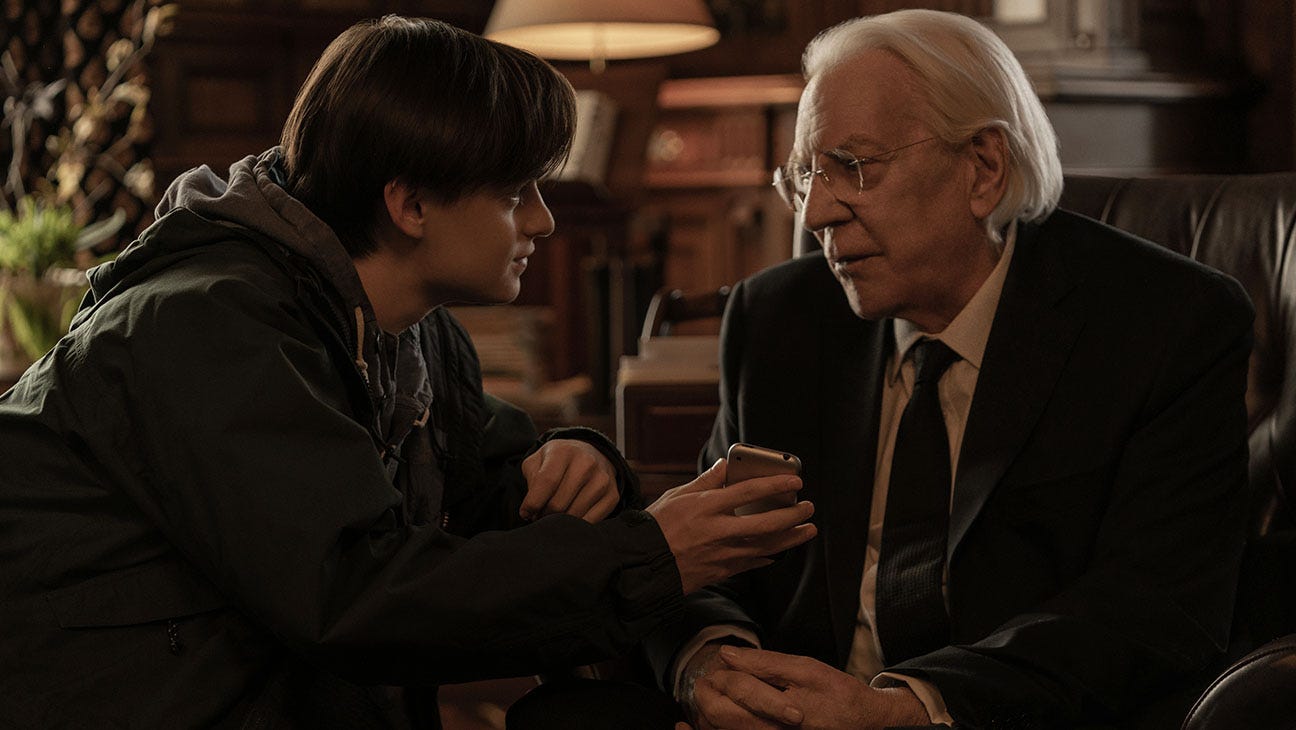
Every once in a while, the movie gods bless you when it’s least expected. You pick something to watch without much thought on a lazy afternoon, yet it somehow catches you like a deer in headlights, becoming something you can’t stop thinking about. Not only does it worm its way into your brain, but it also awakens something in your very soul.
MR. HARRIGAN’S PHONE (2022) – a sleepy little “horror thriller” you probably overlooked on Netflix – is one of these movies…for me. And I suspect only me.
The film stars Donald Sutherland in one of his final roles, as well as Jaeden Martell—one of the youngin’s they put in every movie requiring a youngin’ these days. It’s written/directed by John Lee Hancock and based on a Stephen King short story from If It Bleeds.
Don’t worry—apart from Donald Sutherland, this shouldn’t strike you as remarkable in any way. No one is familiar with John Lee Hancock’s previous work (it’s fine) and Stephen King has a million adaptations out there; some good, many bad. Most critics consider MR. HARRIGAN’S PHONE to be pretty bad.
Mid-budget-direct-to-Netflix movies like MR. HARRIGAN’S PHONE are easy targets. Folks revel in pointing out what didn’t work, or why people should not like it. They boldly assume the movie is trying to say [x] and that it fell short because of [y]. Normal moviegoers, in turn, seek out these faults when viewing the film, muddying the intended experience. Audiences are too busy confirming preconceived notions (or at least noticing them) instead of letting the film wash over them. Sometimes, folks simply don’t get it and seek out reviews to confirm why.
In these types of reviews—scathing, dismissive, cynical—critics rarely point out what a film gets right. In best cases, it’s one or two statements. Consolation prizes. After all, why should a critic—deep thinkers, intelligentsia, the people we pay to interpret art—think… critically? Why weigh the pros when the cons are so obvious? Shouldn’t they grab the low-hanging fruit instead of the delicious morsels that dwell in the highest branches?
In the case of MR. HARRIGAN’S PHONE (2022), I think there was wayyy too much going on. Its sleepy aesthetic and slow pace allowed its overall ethos to go undetected. There’s a lot to unpack, let alone understand or care about. It’s a Dickensian-paranormal-coming-of-age-cautionary-tale-as-retrospective packaged as a horror thriller, and many people don’t even know what Dickensian means.
I guarantee Stephen King does though! And many adaptors of King’s work seem to forget he’s a writer, first and foremost, not just a horror slop slot machine. His work has layers. Deeper meaning. Emotional resonance. Rising action. Conflict. Denouement. There’s just as much sentimental subtext in Christine, Pet Semetary, Salem’s Lot, The Shining, Cujo, Misery and Dreamcatcher as there is in more obvious work like The Shawshank Redemption, Stand By Me and The Green Mile. The King well is deep and delicious! Dig in!
MR. HARRIGAN’S PHONE is no exception. Just listen to the premise: A motherless young boy grows a strong bond with a wealthy elderly recluse, Mr. Harrigan, after being hired to read aloud to him. The bond seems to be so strong that it outlasts death, as the boy continues to communicate with the deceased Harrigan via cell phone text messages. It also proves to be so strong that the ghostly Mr. Harrigan helps dispatch multiple people at the boy’s request.
Reading that, you’d assume the film focuses on that last sentence. It offers much more opportunities for gore, thrills, chills and spooks. But Hancock—in his infinite wisdom and folly—focuses on the boy’s bond with Mr. Harrigan as well as their overall character arcs. The boy’s arc is typical of any coming-of-age story, whereas Mr. Harrigan’s is a cautionary tale of power and regret. These two vantages coalesce into the boy’s own eventual power via cell phone and how he wields it.
Is Mr. Harrigan’s lesson to dispatch those who stand in the way? Or to grant mercy when able? Which will haunt you later in life? Which will echo longer into the future?
But who gives a shit, right? We wanna see death, distress, jump scares and CGI-imposed brains splattered across the screen! I don’t, personally, but these seem to be the qualifiers that ban MR. HARRIGAN’S PHONE to the shadow realm of forgotten films. We don’t want something to chew on and consider. We want keys jangled in front of our faces.
Perhaps it’s my own folly that caused me to write this particular post. I’ve told folks that I don’t have much to say beyond, “I liked this movie that no one else liked!” And maybe you will, too. Maybe you’ll watch MR. HARRIGAN’s PHONE and consider it from an emotional, character-driven vantage. Maybe you’ll watch other Stephen King films – perhaps films in general! – with the mindset of, “What is this piece of art really trying to say?” Maybe the reign of critics panning or embracing movies is over! Maybe we’re finally moving away from the polar world of black and white toward nuance!
I doubt it though.





